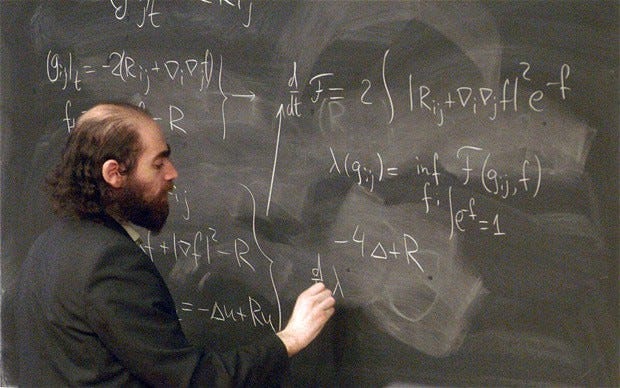The Genius Who Rejected Fame and Fortune: Grigori Perelman
Written on
Chapter 1: The Enigma of Grigori Perelman
The phrase “I prefer not to be on display like an animal in a zoo” encapsulates Grigori Perelman’s stance on fame.

True genius, much like love, is its own reward. After my friend Larry Davis, a clinical psychologist, sent me an intriguing article titled “Grigory Perelman, the math genius who said no to $1 million,” I found myself contemplating his decision.
Before I could dive into the article, Larry reached out via FaceTime. “What’s going on with Perelman? Is he really crazy?” he asked.
I smiled and thought of a quote from Einstein: “A question that sometimes drives me hazy: am I or are the others crazy?”
This quote perfectly captured the essence of our conversation.
What One Person Sees as Madness, Another Sees as Genius
Aristotle once noted that “there’s no great genius without some touch of madness.” This makes one wonder if the so-called “real world” is merely a fantasy agreed upon by the most rational among us.
Society sets the boundaries of what is considered sane, and anything outside of that is labeled as madness. From the early days of standing in lines at school to the rigid schedules of adulthood, we are conditioned to conform.
Hence, when asked to think creatively, many hesitate, feeling they haven’t yet grasped conventional thinking.
Perelman, akin to Einstein and Newton, has always danced to a different rhythm. His devotion lies not with another individual, but with Mathematics itself. As Descartes remarked, “With me, everything turns into mathematics.”
Much like Ramanujan, who was so absorbed in his theories that his wife had to feed him, Perelman views everything through a mathematical lens. He evaluates friendships, job prospects, and more through this prism. For him, mathematics holds a divine status.
Due to this unconventional approach, the world often dismisses him as eccentric.
The Psychology Behind Perelman’s Decision
Alongside Sir Andrew Wiles, Perelman is a prominent figure in the world of Pure Mathematics.
To understand Perelman’s choice, one must appreciate the profound connection he has with mathematics. It’s akin to the love one feels when they hear “I love you.”
I personally connected with mathematics on March 3, 2019, coinciding with Georg Cantor’s birthday. Cantor, known for exploring the concept of infinity, faced his own struggles with reality, reminiscent of Nietzsche’s warning: “If you gaze into the abyss, the abyss gazes also into you.”
For nearly a year, while working on the Pure Mathematics Code, I became engrossed in the subject, seeing patterns everywhere. My mind transformed into a calculating machine, revealing the almost religious nature of pure mathematics.
Mathematics, as Lord Kelvin stated, serves as the only true metaphysics. Just as a monk wouldn’t forsake their beliefs for fame or fortune, Perelman understands that not everything that glitters is gold.
When asked why he declined fame and a fortune, Perelman’s reply was succinct yet powerful: “Emptiness is everywhere and it can be calculated. I know how to control the universe. So tell me, why should I run for a million?”
The Takeaway
I once envisioned a man trapped in a snow globe, scribbling equations with a forlorn expression.
“Dear Universe,” I whispered, “Why is his fate so lonely?”
The Universe responded, “Don’t fret, for he is content. He’s found joy in a perfect world.”
Many chase after wealth, relationships, or fleeting pleasures, but ultimately, they seek happiness. As Aristotle proclaimed, “Happiness is the meaning and the purpose of life.”
If all pursuits lead to happiness, then Perelman, who finds joy in pure mathematics, would be foolish to abandon that for fame or fortune.
Genius, indeed, is its own reward. Perhaps after experiencing the allure of riches, Perelman realized the truth behind the saying: the appetite grows with eating.
Famed individuals often wish for the ability to switch off their notoriety.
Genius is akin to childlike wonder, as illustrated by Einstein and Darwin, who dedicated years to their respective fields driven by pure curiosity.
In essence, the joy of childhood exploration surpasses the gratification of adult rewards. As Perelman wisely noted after declining the illustrious Fields Medal: “I’m not interested in money or fame; I don’t want to be on display like an animal in a zoo.”
Chapter 2: Perelman’s Philosophy on Fame and Mathematics
In this insightful video, "Why Grigori Perelman turned down the Fields Medal," Avi Loeb and Lex Fridman discuss the mathematician's unique perspective on fame and recognition.
Another compelling video titled "The Genius Who Refused a Million Dollars" explores Perelman's extraordinary decision and its implications on the nature of genius and fulfillment.